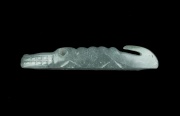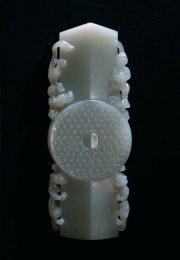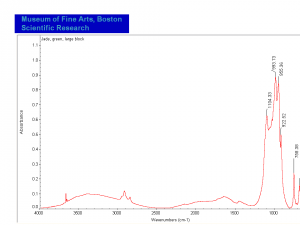Difference between revisions of "Jade"
| (3 intermediate revisions by 3 users not shown) | |||
| Line 1: | Line 1: | ||
| − | [[File:1988.1199-SC31014.jpg|thumb|]] | + | [[File:1988.1199-SC31014.jpg|thumb|Crocodile jade pendant<br>MFA# 1988.1199]] |
== Description == | == Description == | ||
| − | + | [[File:20.740-C38559CR-d1.jpg|thumb|Chinese guibi<br>MFA# 20.740]] | |
A very hard stone ranging in color from pale to dark green. Jade is composed of either the mineral [[jadeite]] or [[nephrite]]. Both are hard enough to scratch glass. Though less common, jadeite is highly valued for its translucent glassy appearance. Jadeite is primarily found in China, Myanmar (formerly Burma), and Mexico. The grass green variety of jade obtained from Myanmar is called Ayah kyauk. Nephrite is found in New Zealand, Australia, Taiwan (nephrite cat's eyes), Turkestan, Korea, Siberia, Mexico, Canada (British Columbia), and the U.S. (Alaska, California, Wyoming). Nephrite is more opaque than jadeite and produces an oily, lustrous appearance when polished. Jade has been used since prehistoric times for small utensils, carvings, vases, and jewelry. Some processing techniques have been used since the 1908s to enhance the color of inferior stones. B-jade has been bleached to remove brown stains, while C-jade has been impregnated with resins to increase its translucency. A-jade is untreated. | A very hard stone ranging in color from pale to dark green. Jade is composed of either the mineral [[jadeite]] or [[nephrite]]. Both are hard enough to scratch glass. Though less common, jadeite is highly valued for its translucent glassy appearance. Jadeite is primarily found in China, Myanmar (formerly Burma), and Mexico. The grass green variety of jade obtained from Myanmar is called Ayah kyauk. Nephrite is found in New Zealand, Australia, Taiwan (nephrite cat's eyes), Turkestan, Korea, Siberia, Mexico, Canada (British Columbia), and the U.S. (Alaska, California, Wyoming). Nephrite is more opaque than jadeite and produces an oily, lustrous appearance when polished. Jade has been used since prehistoric times for small utensils, carvings, vases, and jewelry. Some processing techniques have been used since the 1908s to enhance the color of inferior stones. B-jade has been bleached to remove brown stains, while C-jade has been impregnated with resins to increase its translucency. A-jade is untreated. | ||
| − | [[ | + | [[[SliderGallery rightalign|Jade.PNG~FTIR]]] |
== Synonyms and Related Terms == | == Synonyms and Related Terms == | ||
jadeite; nephrite; greenstone; Ayah kyauk; kidney stone; jade (Fr., Port.); pietra de la hijada (Esp.); Jade (Deut.); jade (Ned.) | jadeite; nephrite; greenstone; Ayah kyauk; kidney stone; jade (Fr., Port.); pietra de la hijada (Esp.); Jade (Deut.); jade (Ned.) | ||
| − | + | ==Physical and Chemical Properties== | |
| − | |||
| − | == | ||
| − | |||
| − | |||
| − | |||
| − | |||
| − | |||
| − | |||
| − | |||
| − | |||
| − | |||
| − | |||
| − | + | * Monoclinic system with fibrous or granular crystalline masses. | |
| + | * Luster = vitreous to waxy. | ||
| + | * Cleavage is good in two directions | ||
| + | * Fluorescence: nephrite does not fluoresce, jadeite may appear pale white in long UV | ||
| + | * Dyed jade appears red when examined with a Chelsea filter. | ||
{| class="wikitable" | {| class="wikitable" | ||
| Line 30: | Line 22: | ||
| 5-6 (nephrite); 6-7 (jadeite) | | 5-6 (nephrite); 6-7 (jadeite) | ||
|- | |- | ||
| − | ! scope="row"| Density | + | ! scope="row"| Density (g/ml) |
| 3.0 (nephrite); 3.3 (jadeite) | | 3.0 (nephrite); 3.3 (jadeite) | ||
|- | |- | ||
| Line 36: | Line 28: | ||
| 1.60-1.69 | | 1.60-1.69 | ||
|} | |} | ||
| − | |||
| − | |||
| − | |||
| − | |||
== Comparisons == | == Comparisons == | ||
| Line 45: | Line 33: | ||
[[media:download_file_460.pdf|Properties of Common Gemstones]] | [[media:download_file_460.pdf|Properties of Common Gemstones]] | ||
| − | + | ==Resources and Citations== | |
| − | + | * E.West Fitzhugh, "Jade" ''The Dictionary of Art'', Grove's Dictionaries Inc., New York, 1996. | |
| − | == | ||
* Jack Odgen, ''Jewellery of the Ancient World'', Rizzoli International Publications Inc., New York City, 1982 | * Jack Odgen, ''Jewellery of the Ancient World'', Rizzoli International Publications Inc., New York City, 1982 | ||
| − | |||
| − | |||
* Michael O'Donoghue and Louise Joyner, ''Identification of Gemstones'', Butterworth-Heinemann, Oxford, 2003 Comment: Description of A-jade, B-jade, and C-jade treatments as well as distinguishing features | * Michael O'Donoghue and Louise Joyner, ''Identification of Gemstones'', Butterworth-Heinemann, Oxford, 2003 Comment: Description of A-jade, B-jade, and C-jade treatments as well as distinguishing features | ||
| Line 61: | Line 46: | ||
* ''Van Nostrand's Scientific Encyclopedia'', Douglas M. Considine (ed.), Van Nostrand Reinhold, New York, 1976 | * ''Van Nostrand's Scientific Encyclopedia'', Douglas M. Considine (ed.), Van Nostrand Reinhold, New York, 1976 | ||
| − | * Website | + | * Website: http://www.geo.utexas.edu/courses/347k/redesign/gem_notes/Jade/jade_triple_page.htm |
* Michael McCann, ''Artist Beware'', Watson-Guptill Publications, New York City, 1979 | * Michael McCann, ''Artist Beware'', Watson-Guptill Publications, New York City, 1979 | ||
Latest revision as of 13:21, 21 September 2022
Description
A very hard stone ranging in color from pale to dark green. Jade is composed of either the mineral Jadeite or Nephrite. Both are hard enough to scratch glass. Though less common, jadeite is highly valued for its translucent glassy appearance. Jadeite is primarily found in China, Myanmar (formerly Burma), and Mexico. The grass green variety of jade obtained from Myanmar is called Ayah kyauk. Nephrite is found in New Zealand, Australia, Taiwan (nephrite cat's eyes), Turkestan, Korea, Siberia, Mexico, Canada (British Columbia), and the U.S. (Alaska, California, Wyoming). Nephrite is more opaque than jadeite and produces an oily, lustrous appearance when polished. Jade has been used since prehistoric times for small utensils, carvings, vases, and jewelry. Some processing techniques have been used since the 1908s to enhance the color of inferior stones. B-jade has been bleached to remove brown stains, while C-jade has been impregnated with resins to increase its translucency. A-jade is untreated.
Synonyms and Related Terms
jadeite; nephrite; greenstone; Ayah kyauk; kidney stone; jade (Fr., Port.); pietra de la hijada (Esp.); Jade (Deut.); jade (Ned.)
Physical and Chemical Properties
- Monoclinic system with fibrous or granular crystalline masses.
- Luster = vitreous to waxy.
- Cleavage is good in two directions
- Fluorescence: nephrite does not fluoresce, jadeite may appear pale white in long UV
- Dyed jade appears red when examined with a Chelsea filter.
| Mohs Hardness | 5-6 (nephrite); 6-7 (jadeite) |
|---|---|
| Density (g/ml) | 3.0 (nephrite); 3.3 (jadeite) |
| Refractive Index | 1.60-1.69 |
Comparisons
Properties of Common Gemstones
Resources and Citations
- E.West Fitzhugh, "Jade" The Dictionary of Art, Grove's Dictionaries Inc., New York, 1996.
- Jack Odgen, Jewellery of the Ancient World, Rizzoli International Publications Inc., New York City, 1982
- Michael O'Donoghue and Louise Joyner, Identification of Gemstones, Butterworth-Heinemann, Oxford, 2003 Comment: Description of A-jade, B-jade, and C-jade treatments as well as distinguishing features
- Encyclopedia of Archaeology, Glyn E. Daniel, ed., Thomas Y. Crowell Co., New York, 1977
- Ralph Mayer, A Dictionary of Art Terms and Techniques, Harper and Row Publishers, New York, 1969 (also 1945 printing)
- Van Nostrand's Scientific Encyclopedia, Douglas M. Considine (ed.), Van Nostrand Reinhold, New York, 1976
- Michael McCann, Artist Beware, Watson-Guptill Publications, New York City, 1979
- George Savage, Art and Antique Restorer's Handbook, Rockliff Publishing Corp, London, 1954
- Tom Rowland, Noel Riley, A-Z Guide to Cleaning, Conserving and Repairing Antiques, Constable and Co., Ltd., London, 1981


